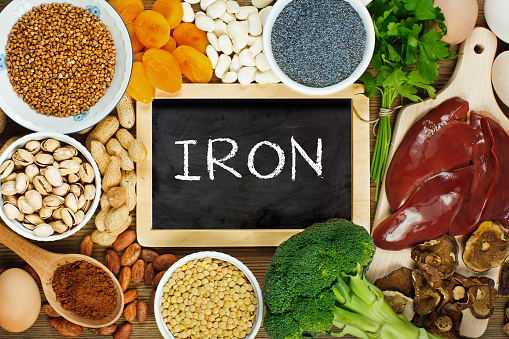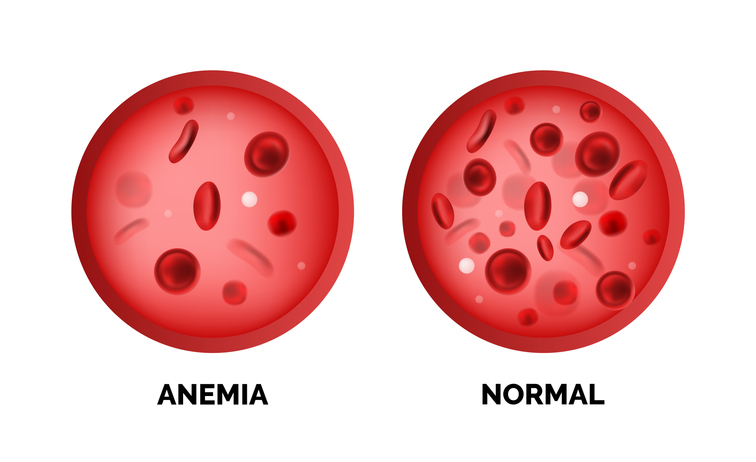Having Trouble Getting Enough Iron? Food Combinations may the Culprit!

When it comes to iron absorption, there is evidence that certain foods – as well as when you eat them – may impact how readily your body absorbs iron. This is important to keep in mind as you plan your diet and meal times. We don’t need a lot of iron, (the average man needs about 1 mg daily and a woman in her reproductive years needs 1.4 mg), but it is a critical mineral that every single cell in your body needs. It is needed to make hemoglobin, a component of your red blood cells that delivers oxygen to all the cells in your body. Without adequate iron, your body may not be able to carry enough oxygen to your vital organs. Low iron levels may also leave you feeling quite tired.
When planning your grocery list, keep in mind that there are two types of iron – heme and non-heme. Heme iron is rich in lean meat, poultry and seafood and is more bioavailable, meaning your body can use it better. Non-heme iron is found in nuts, grains, vegetables and other fortified products. It is not as bioavailable as heme iron or readily absorbed and metabolized by your body.
If getting enough iron was just about including meats, seafood and plant-based foods in your diet, you could probably overcome any absorption issues caused by your genetics, physical condition or age. While this would probably hold for many other nutrients, when it comes to iron it’s not quite that straightforward since iron also interacts with other nutrients. Some foods may enhance your body’s ability to absorb iron, others reduce iron absorption or have an effect if the foods containing them are eaten around the same time as you eat iron-rich foods (or take a physician-prescribed iron supplement).

How to increase iron consumption?
One easy way to increase iron absorption is to include more foods high in vitamin C, such as citrus fruits and vegetables, in your diet. It also is quite effective, with studies indicating that only 100 mg (a little more than a cup of orange slices) of vitamin C can increase iron absorption from any given meal by a little over 4 times. Other foods that enhance iron absorption are:
- Those rich in beta-carotene, such as peaches, spinach, sweet potatoes, corn and collard greens
- Meats, which contain heme iron, can increase the absorption of non-heme iron
- Fruits, honey and black-strap molasses (the latter in moderation, for example with cereals)
- Certain breads and dairy products (again, in moderation)
Conversely, there are certain foods and nutrients that may make it harder for your body to absorb iron. These include:
- Chocolate, tea, and others, such as spinach, that contain oxalates
- Eggs, which contain a compound known as phosvitin
- Coffee, cocoa, tea and others that contain polyphenols
- Soy food, whole-wheat products, walnuts and others that contain phytates
- Dairy and other products, such as cheese and yogurt which contain calcium
Be Proactive
There are several things you can be doing to make sure your body is getting enough of this critical nutrient. The first is to take a nutrient test to see if your body is getting enough iron, as well as other important nutrients. A nutrient test, along with a consultation with your physician or a competent healthcare provider, is also in order if you experience any signs of iron deficiency. These include fatigue, weakness, headache, shortness of breath, cold hands or feet, and feeling dizzy or lightheaded.
Depending on whether your body has a good balance of iron (not too much, not too little), here are steps you can take to achieve and maintain this balance:
- Understand and keep a list of which foods enhance iron absorption and which foods impair it
- If you need to increase iron, be sure to leave between one and two hours between eating iron-rich foods and those foods that can impair absorption
- When possible, try to separate exercise and high-iron meals by around 12 hours so that if, for example, you exercise in the morning, your high-iron meal will be in the evening
If you have sickle cell disease, thalassemia, cancers or blood diseases, it is important to consult with your doctor before adjusting your diet to try and increase or impair iron absorption. (For more information about iron, read here).
Enjoy your healthy life!







